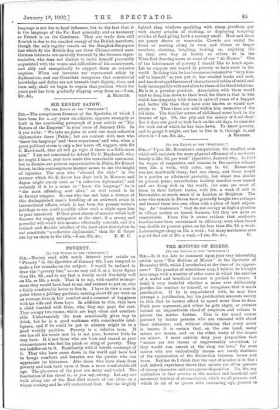POVERTY.
[To THE EDITOR OF THE "SPECTATOIL"J
Sus,—Having read with much interest your article on " Poverty " in the Spectator of January 4th, I am tempted to make a few remarks on the subject. I would be inclined to draw the "poverty line," as cne may call it, at a lower figure than 21s. 8c1, and to say that a family could live fairly well on 15s. or 16s. a week. That is to say, with careful manage- ment they would have food to eat and raiment to put on, also a fairly comfortable house to live in. I have in view a case in point where a jobbing gardener, earning about £1 per week on an average, lives in fair comfort and a measure of happiness with his wife and three boys. In addition to this, they have a child boarded with them, who, they say, pays the rent. They occupy two rooms, which are kept clean and comfort- able. Unfortunately the man occasionally gives way to drink, but he is a good workman with considerable intel- ligence, and if he could be got to abstain might be in a good worldly position. Poverty is a relative term. If one has all his wants met he is not poor, however little he may have. It is not those who are born and reared in poor circumstances who feel the pinch or sting of poverty. They are indifferent to it. Familiarity with it breeds contempt of it. They who have come down in the world and have bad to forego comforts and luxuries are the parties who can appreciate its bitterness. Also those who have risen from poverty and look back upon it from a more comfortable old age. The pleasures of the poor are many and varied. The fascination of the street is, as yoti say, strong. Let any one walk along one of the East.End streets of our cities on a winter evening and he will understand that. See the brightly lighted shop windows sparkling with cheap jewellery, gay with showy articles of clothing, or displaying tempting articles of food giving forth a savoury smell. Here and there are penny shows or waxworks. Crowds are round the doors or moving along in twos and threes or larger numbers, chatting, laughing, looking on, enjoying life in their own way as keenly as others do in the West-End drawing-room at some of our "At Homes." One of the bitternesses of poverty I should like to touch upon. Let us suppose one reared in poverty to have risen in the world. In doing this he has become accustomed to "keep him- self to himself," as you put it, has studied books and men, and has developed features of character and habits of mind and body incompatible with and alien to those of his blood relations. He is in a peculiar position. Association with them would tend to drag him down to their level, for there is that in him which has sympathy with them in spite of years of a happier and better life than they have ever known or would now attain to. Then there are still within him memories of the old days. The familiar scenes of childhood come back in the dreams of age. Oh, the pity and the misery of it all then! Yet it does one good to look back on the old days, to consider the rock out of which he has been hewn. To know poverty, and to gauge it aright, one has to live in it, through it, and






































 Previous page
Previous page